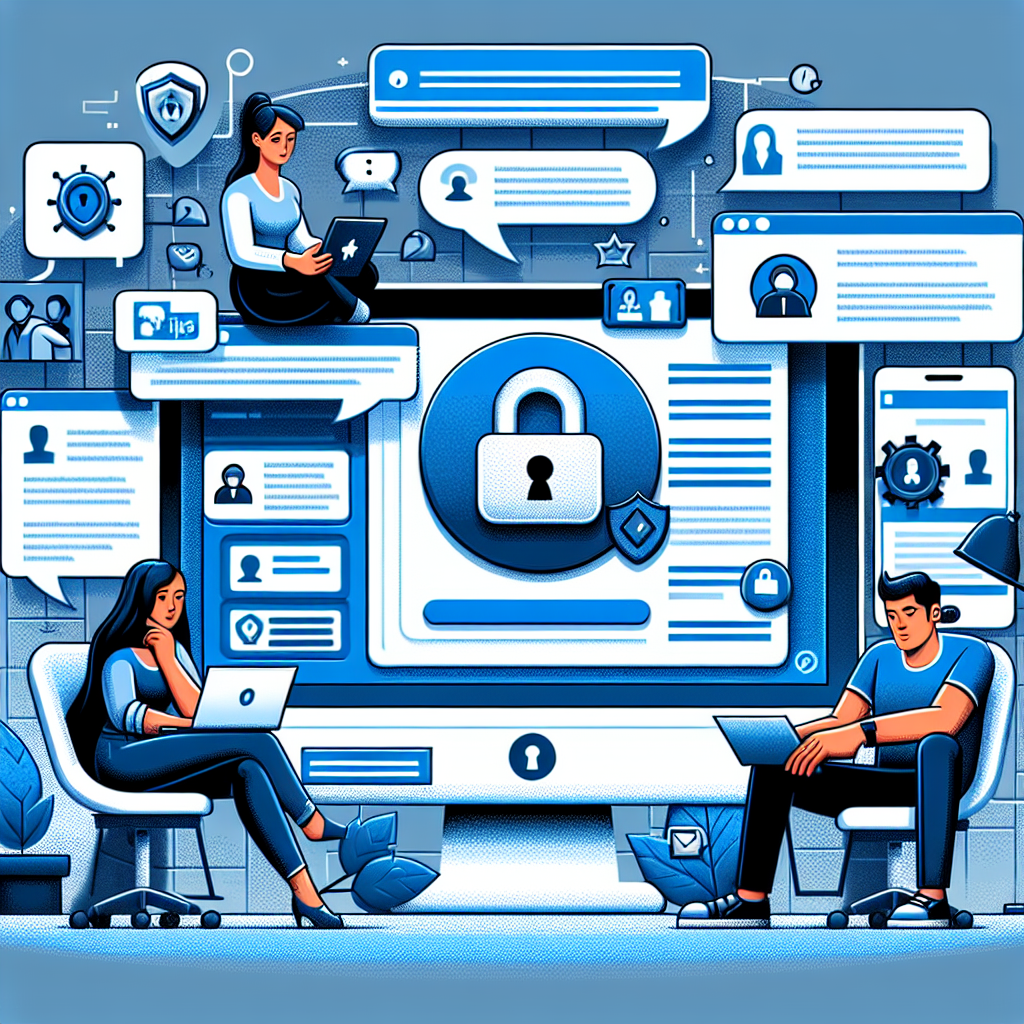In this day and age, online chat rooms and forums have become a common way to connect with others from all around the world. However, it is important to remember that not all individuals may have good intentions. Therefore, it is crucial to stay vigilant and take precautions to ensure your safety while engaging in online conversations. This article will provide you with valuable tips and strategies to protect yourself from potential dangers while using online chat rooms and forums. By following these tips, you can enjoy the benefits of online communication without compromising your safety and well-being.
Understanding the Risks of Online Chat Rooms and Forums

Online chat rooms and forums provide a platform for interaction and communication with individuals from diverse backgrounds. However, it is crucial to be aware of the potential risks associated with engaging in these online spaces.
- Potential for encountering cybercriminals
- Cybercriminals often lurk in online chat rooms and forums to exploit unsuspecting individuals. They may use deceptive tactics to trick users into sharing sensitive information or clicking on malicious links.
-
It is essential to exercise caution and avoid engaging with suspicious individuals who prompt you to disclose personal details or download files.
-
Risks of sharing personal information
- One of the significant risks of online chat rooms and forums is the inadvertent disclosure of personal information. Users may unknowingly share details such as their full name, address, phone number, or financial information, putting themselves at risk of identity theft or online harassment.
-
Always be mindful of the information you share online and refrain from divulging sensitive details that could compromise your safety and privacy.
-
Possibility of encountering harmful content or individuals
- Online chat rooms and forums can sometimes host harmful content, including hate speech, explicit material, or discussions promoting violence or illegal activities.
- It is important to be vigilant and report any inappropriate or abusive behavior to the platform administrators. Additionally, consider using moderation tools or filters to limit your exposure to harmful content.
Identifying Red Flags in Online Interactions
When engaging in online chat rooms and forums, it’s crucial to be vigilant and recognize potential red flags that could indicate a risky situation. Here are some key signs to watch out for:
-
Unwillingness to disclose information: If someone you are chatting with consistently avoids sharing basic details about themselves or becomes evasive when asked simple questions, it may be a red flag. Genuine interactions often involve a mutual exchange of information, and reluctance to disclose basic facts could indicate a lack of transparency or potential deceit.
-
Pressuring for personal details: Be cautious of individuals who aggressively push for your personal information, such as your full name, address, phone number, or financial details. Respectable online interactions should respect boundaries and not demand sensitive information. If someone is pressuring you to divulge personal details, it’s advisable to exercise caution and consider ending the conversation.
-
Inconsistencies in stories: Pay attention to inconsistencies or discrepancies in the information shared by individuals in online interactions. If someone’s stories or details about themselves frequently change or contradict previous statements, it could be a warning sign of dishonesty or ulterior motives. Trust is built on consistency and honesty, so inconsistencies in narratives should raise concerns about the credibility of the individual.
Establishing Secure Online Practices
When it comes to using online chat rooms and forums, establishing secure online practices is crucial to safeguarding your personal information and privacy. By following these tips, you can help protect yourself from potential cyber threats:
-
Creating a strong and unique password: One of the first steps in ensuring online security is to create a strong and unique password for each of your accounts. Avoid using easily guessable passwords such as “123456” or “password.” Instead, opt for a combination of letters, numbers, and special characters to make your password more secure.
-
Using a secure and reputable platform: It is essential to choose a chat room or forum hosted on a secure and reputable platform. Look for websites that use encryption to protect your data and have privacy policies in place to safeguard your information. Avoid accessing chat rooms or forums on unsecured networks or platforms that seem suspicious.
-
Avoiding clicking on suspicious links or downloading unknown files: Be cautious when interacting with links or files shared in chat rooms or forums. Clicking on suspicious links can lead to malware infections or phishing attacks, compromising your device and personal data. Before clicking on any link, verify its source and ensure it is from a trusted sender. Similarly, refrain from downloading files from unknown sources to prevent potential security risks.
By implementing these secure online practices, you can enhance your safety while using online chat rooms and forums and reduce the risk of falling victim to cyber threats.
Implementing Privacy Settings
In online chat rooms and forums, implementing robust privacy settings is crucial to safeguarding personal information and maintaining online safety. By taking proactive measures to control the visibility of your data, you can reduce the risk of potential privacy breaches and protect yourself from unwanted attention or malicious intent. Here are some key strategies for implementing effective privacy settings:
-
Limiting the information visible to others: Start by carefully evaluating the type of information you share on your profile or account. Consider restricting access to sensitive details such as your full name, address, phone number, or financial information. By limiting the visibility of personal data, you can minimize the chances of identity theft or cyberstalking.
-
Being cautious about sharing location data: Avoid disclosing real-time location updates or specific whereabouts in online conversations. Location-based information can compromise your safety by revealing your physical presence to strangers or potential threats. Disable location services for chat applications and forums to prevent unauthorized tracking or monitoring of your movements.
-
Reviewing and adjusting privacy settings regularly: Periodically review and update your privacy settings on chat rooms and forums to reflect any changes in your online activity or preferences. Stay informed about platform updates or policy revisions that may impact the visibility of your data. Adjust privacy controls according to your comfort level and the level of protection you require for maintaining online security. Regular monitoring of privacy settings can help you stay vigilant against emerging threats and unauthorized access to your personal information.

Engaging in Safe Communication
When participating in online chat rooms and forums, engaging in safe communication practices is crucial to protect your privacy and security. Here are some essential tips to help you navigate these platforms safely:
-
Being mindful of the information shared: Before sharing any details about yourself, consider the potential risks involved. Limit the personal information you disclose, such as your full name, address, phone number, or financial details. Remember that once information is shared online, it can be challenging to control its dissemination.
-
Avoiding sharing sensitive or personal details: To maintain your privacy and safety, refrain from sharing sensitive information that could compromise your security. This includes details about your daily routine, upcoming travel plans, or any confidential information that could be exploited by malicious users.
-
Reporting any suspicious or inappropriate behavior: If you encounter any behavior that makes you feel uncomfortable or unsafe, do not hesitate to report it to the platform administrators. Most online chat rooms and forums have mechanisms in place to address inappropriate conduct, such as harassment, cyberbullying, or solicitation. By reporting such behavior, you contribute to creating a safer online environment for yourself and other users.
Building Trust Gradually
Building trust in online chat rooms and forums is crucial for maintaining safety and security while interacting with other users. By taking the time to establish trust gradually, individuals can protect themselves from potential risks and threats. Here are some important strategies to consider:
-
Getting to Know Other Users: One of the key aspects of building trust is getting to know the other users in the chat room or forum. By engaging in conversations and observing how others interact, individuals can gain insights into the personalities and intentions of different users.
-
Being Cautious of Rushed Conversations: It’s essential to be wary of individuals who try to rush into personal conversations or request sensitive information too quickly. Building trust should be a gradual process that allows for a natural development of rapport and understanding between users.

– Verifying Identity Before Sharing Information: Before disclosing any personal information or details, it’s important to verify the identity of the person you are interacting with. This can involve asking targeted questions, cross-referencing information shared by the other user, or conducting additional research to confirm their authenticity.
Educating Yourself and Others
- Staying informed about online safety practices
- Keeping up-to-date with common online threats such as phishing scams, malware, and identity theft.
- Researching and understanding privacy settings on chat rooms and forums to control what information is shared.
- Learning about the importance of strong passwords and how to create them to prevent unauthorized access to accounts.
-
Familiarizing oneself with the reporting and blocking features on chat platforms to address any inappropriate behavior.
-
Teaching children and teenagers about online risks
- Providing age-appropriate guidance on the potential dangers of sharing personal information online.
- Discussing the importance of not meeting strangers from online interactions in person.
- Setting boundaries and time limits for online chat room and forum usage to ensure safe and responsible participation.
-
Emphasizing the significance of seeking help from adults if they encounter any suspicious or uncomfortable situations while chatting online.
-
Encouraging open communication about online experiences
- Creating a safe and non-judgmental environment for individuals to share their online interactions and seek guidance if needed.
- Establishing regular check-ins to discuss any concerns or incidents that may have occurred while using chat rooms or forums.
- Encouraging the sharing of positive experiences online to promote a healthy and enjoyable online presence.
- Reinforcing the idea that open communication is key to staying safe and protected while engaging in online conversations.
Seeking Help and Support
When encountering any suspicious or harmful behavior while engaging in online chat rooms and forums, it is crucial to seek help and support promptly. Here are some effective strategies to consider:
-
Contacting platform moderators or administrators: If you witness or experience any inappropriate conduct, do not hesitate to reach out to the moderators or administrators of the chat room or forum. They are responsible for maintaining a safe and respectful environment for all users. Provide them with specific details of the incident so they can take appropriate action.
-
Seeking guidance from online safety resources: There are numerous online safety resources available that offer guidance on how to handle various situations in chat rooms and forums. These resources often provide tips on identifying potential risks, dealing with cyberbullying, and protecting your personal information. Take advantage of these resources to enhance your knowledge and stay informed about online safety practices.
-
Reporting any concerning behavior or incidents to the appropriate authorities: If you feel threatened or uncomfortable due to someone’s behavior in an online chat room or forum, consider reporting it to the relevant authorities. Depending on the severity of the situation, you may need to contact law enforcement or online safety organizations that specialize in addressing cyber threats. Your proactive reporting can help prevent further harm and ensure the safety of yourself and other users.
FAQs Tips for Staying Safe While Using Online Chat Rooms and Forums
What are some tips for staying safe while using online chat rooms and forums?
It is important to never share personal information such as your full name, address, phone number, or any other identifying information with strangers online. Be cautious of individuals who ask for this information, as they may have malicious intentions. Additionally, be wary of clicking on any links or downloading any files from unknown sources, as they may contain viruses or malware. It is also recommended to use a strong, unique password for each online account and to never share your passwords with anyone else.
How can I verify if someone is who they say they are in an online chat room or forum?
It can be challenging to verify someone’s identity online, as individuals can easily create fake profiles or personas. One way to potentially verify someone’s identity is to ask for additional information or proof before sharing any personal information yourself. This may include asking the individual to video chat with you or providing information that only the true person would know. However, it is important to remember that even with these precautions, there is no foolproof way to guarantee someone’s identity online.
What should I do if I encounter suspicious or inappropriate behavior in an online chat room or forum?
If you come across any suspicious or inappropriate behavior in an online chat room or forum, it is important to report it to the website or forum moderators immediately. Most online platforms have mechanisms in place for reporting abusive behavior, such as a report button or contact information for moderators. It is important to not engage with the individual exhibiting suspicious behavior and to block them if necessary. Additionally, if you feel unsafe or threatened in any way, it is important to reach out to a trusted friend or family member for support.


